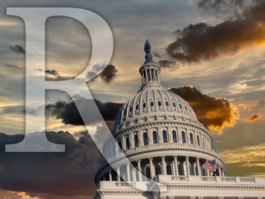Government by Coup de Theatre or the Constitution?
A Commentary By Tony Blankley
How have we arrived at this place where the fate of our federal budget -- our economy, indeed our capacity to have a functioning federal government -- seems to depend on what two men (the speaker of the House and the president) may or may not be secretly talking about in an interior room in the White House?
Meanwhile, elected representatives and senators, kept ignorant of those life-and-death discussions, are forced to wait. When the two men are finished -- doubtlessly mere hours before "the world will end" -- our elected representatives and senators will be stampeded to vote yes for a deal about which no one knows the details. Cattle may need to be stampeded; elected representatives of the American people never should be so compelled.
The country will learn from a compliant Washington press corps that to vote no would be an irresponsible act verging on treason to the people. The reporters won't know what's in the deal any more than the congressmen -- or the president or the speaker -- but they will smugly mug any noncompliant elected representative.
Government by the elected representatives of the people is coming to be government by two (or three or four) men in a secret room pronouncing the new law that will be rubber-stamped -- or else!
Accepting such a process as normal is a new phenomenon, but it is becoming in Washington an acceptable procedure. Consider the following from The Washington Post in last Sunday's paper:
"The nation's leaders tried again Saturday to return to regular order after an extraordinary spectacle Friday night, when negotiations over debt and deficits gave way to acrimony and recriminations between President Obama and House Speaker John A. Boehner (R-Ohio). They have little time to repair the damage."
Consider that phrase "regular order," which was used to describe the process of the speaker and the president's returning to their private negotiations.
Regular order is a Washington term of art that means the exact opposite of the writing of a bill in secret by a few congressional leaders and the president. It means letting each house of Congress introduce bills, hold open committee hearings, mark up the legislation in public, vote for it and then send it to the floor, where it is discussed openly and then voted for and sent to the president for signature.
Both former House Speaker Nancy Pelosi and current Speaker Boehner have called for "regular order," as opposed to secret deals.
Boehner said a few years ago: "We need to stop writing bills in the speaker's office and let members of Congress be legislators again. Too often, in the House right now, we don't have legislators; we just have voters. ... The institutions of the House that have grown up over 200 years of trial and error are the best to test those ideas and policies. We don't need five members sitting behind a closed door writing a bill," as they did with the stimulus and Obamacare. "It's nuts."
Twenty years ago, that would have been a commonplace observation. But in the past two decades, both Republican and Democratic presidents and Congresses have increasingly resorted to secret meetings and forced deals: President George H.W. Bush in the 1990 budget summit with a Democratic Congress; President Bill Clinton and congressional Republicans in 1995-96 over budget deals; Obama and the stimulus and Obamacare legislation in 2009; Obama and Boehner this year with the continuing budget resolution; and now the Aug. 2 deadline for the debt ceiling and deficit negotiations.
This is not merely procedural quibbling; it goes to both the quality of the legislation and the nature of representative government.
I have been in some of those secret meetings in the past. Even the smartest, best-informed presidents and speakers (e.g., Clinton and Newt Gingrich) cannot possibly know the fuller implications of all the agreements they are making. Neither can the handful of top staffers in such rooms.
That is why, with the woeful experience of the past 20 years, members of Congress (and the public) are increasingly -- and correctly -- distrustful of what the "deal" really is.
That is why Pelosi was technically correct -- if appalling -- when she said regarding Obamacare, "We have to pass the bill so that you can find out what is in it." The top leaders are incapable of drafting a big technical bill. The details will get written by staffers and regulators after the bill is enacted into law. That is why now, for example, a year after the Dodd-Frank financial regulation law was passed, more than 200 regulations -- all the teeth of the bill -- have yet to be even drafted by regulators.
That is why when regular order is followed and laws are enacted as they have been for 200 years -- both in Congress and the executive branch -- hundreds of highly specialized staffers have to be called upon to explain what broad-brush numbers will mean in real life. What does cutting $100 billion from hospital reimbursement under Medicare mean, precisely, regarding how treatment will be provided or not provided? What does $700 billion in reduced defense spending over the next decade mean, precisely, about our Navy's ability to protect the South China Sea from Chinese efforts to dominate it?
Each time we have one of these secret deal negotiations -- instead of regular order -- the magnitude of the proposed change in our way of life gets bigger, and the process gets more exclusive and sloppier. This is not only bad legislating but also dangerous to our constitutional process.
The Roman Republic eventually, during the first century B.C., gave way to imperial dictatorship, as the Senate more and more yielded to generals and strongmen to fix the various financial and land distribution problems; the Senate lost the will and capacity to fix itself.
If we don't use our representative congressional rights, we eventually will lose them. A warning.
Tony Blankley is executive vice president of Edelman public relations in Washington. E-mail him at TonyBlankley@gmail.com.
COPYRIGHT 2011 CREATORS.COM
See Other Commentaries by Tony Blankley .
See Other Political Commentary
Views expressed in this column are those of the author, not those of Rasmussen Reports. Comments about this content should be directed to the author or syndicate.
Rasmussen Reports is a media company specializing in the collection, publication and distribution of public opinion information.
We conduct public opinion polls on a variety of topics to inform our audience on events in the news and other topics of interest. To ensure editorial control and independence, we pay for the polls ourselves and generate revenue through the sale of subscriptions, sponsorships, and advertising. Nightly polling on politics, business and lifestyle topics provides the content to update the Rasmussen Reports web site many times each day. If it's in the news, it's in our polls. Additionally, the data drives a daily update newsletter and various media outlets across the country.
Some information, including the Rasmussen Reports daily Presidential Tracking Poll and commentaries are available for free to the general public. Subscriptions are available for $4.95 a month or 34.95 a year that provide subscribers with exclusive access to more than 20 stories per week on upcoming elections, consumer confidence, and issues that affect us all. For those who are really into the numbers, Platinum Members can review demographic crosstabs and a full history of our data.
To learn more about our methodology, click here.



